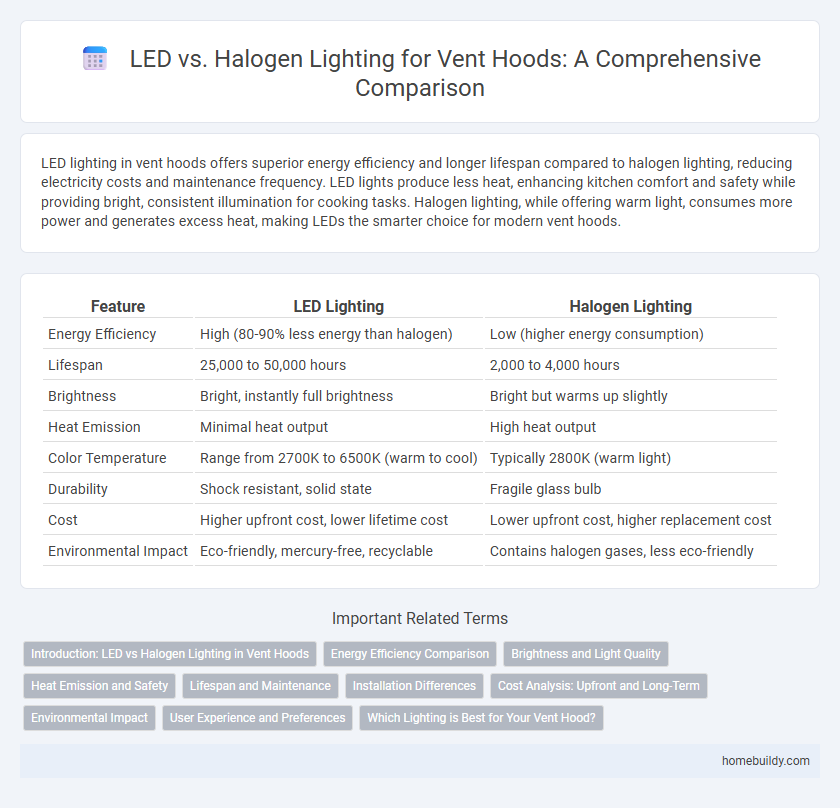LED lighting in vent hoods offers superior energy efficiency and longer lifespan compared to halogen lighting, reducing electricity costs and maintenance frequency. LED lights produce less heat, enhancing kitchen comfort and safety while providing bright, consistent illumination for cooking tasks. Halogen lighting, while offering warm light, consumes more power and generates excess heat, making LEDs the smarter choice for modern vent hoods.
Table of Comparison
| Feature | LED Lighting | Halogen Lighting |
|---|---|---|
| Energy Efficiency | High (80-90% less energy than halogen) | Low (higher energy consumption) |
| Lifespan | 25,000 to 50,000 hours | 2,000 to 4,000 hours |
| Brightness | Bright, instantly full brightness | Bright but warms up slightly |
| Heat Emission | Minimal heat output | High heat output |
| Color Temperature | Range from 2700K to 6500K (warm to cool) | Typically 2800K (warm light) |
| Durability | Shock resistant, solid state | Fragile glass bulb |
| Cost | Higher upfront cost, lower lifetime cost | Lower upfront cost, higher replacement cost |
| Environmental Impact | Eco-friendly, mercury-free, recyclable | Contains halogen gases, less eco-friendly |
Introduction: LED vs Halogen Lighting in Vent Hoods
LED lighting in vent hoods offers superior energy efficiency and longer lifespan compared to halogen bulbs, reducing electricity consumption by up to 80%. Halogen lights generate higher heat and consume more power, resulting in increased energy costs and shorter replacement intervals. Choosing LED lighting enhances kitchen safety and sustainability through lower heat emission and durable performance.
Energy Efficiency Comparison
LED lighting in vent hoods consumes up to 75% less energy compared to halogen bulbs, significantly reducing electricity costs over time. LEDs offer longer lifespans, often exceeding 25,000 hours, which decreases replacement frequency and maintenance expenses. Halogen lights generate more heat, increasing ventilation demands and energy usage, whereas LEDs operate cooler, enhancing overall kitchen energy efficiency.
Brightness and Light Quality
LED lighting in vent hoods delivers superior brightness with higher lumens per watt compared to halogen bulbs, enhancing cooking visibility while being energy efficient. The light quality of LED is more consistent and cooler in temperature, reducing heat output and providing a clearer, more natural illumination of food surfaces. Halogen lighting, while offering warmer tones, tends to be less energy-efficient and generates more heat, potentially affecting kitchen comfort during extended cooking sessions.
Heat Emission and Safety
LED lighting in vent hoods emits significantly less heat compared to halogen lighting, reducing the risk of overheating and enhancing kitchen safety. Lower heat emission from LEDs minimizes potential fire hazards and prevents damage to surrounding surfaces and components. Energy-efficient LEDs also contribute to a cooler cooking environment, improving overall ventilation performance.
Lifespan and Maintenance
LED lighting in vent hoods offers a significantly longer lifespan, typically lasting up to 25,000 hours compared to halogen bulbs that last around 2,000 hours. This extended lifespan reduces the frequency of replacements, minimizing maintenance efforts and costs over time. Furthermore, LED lights produce less heat, enhancing the durability and performance of vent hood components, while halogen bulbs often demand more frequent inspections and replacements due to shorter lifespans and higher operating temperatures.
Installation Differences
LED lighting in vent hoods typically requires low-voltage wiring and is compatible with energy-efficient circuits, simplifying installation with fewer concerns about heat dissipation. Halogen lighting demands higher voltage connections and specialized fixtures to manage excessive heat output, often necessitating additional ventilation and more complex electrical integration. Choosing LED lighting reduces installation time and enhances safety due to lower heat emission and simpler wiring requirements.
Cost Analysis: Upfront and Long-Term
LED lighting in vent hoods offers a higher upfront cost compared to halogen bulbs but significantly reduces long-term expenses due to lower energy consumption and extended lifespan. Halogen lighting typically consumes more electricity, leading to increased utility bills and more frequent replacements, raising overall maintenance costs. Investing in LED lighting enhances energy efficiency and cost-effectiveness over the vent hood's operational life.
Environmental Impact
LED lighting in vent hoods drastically reduces energy consumption by using up to 75% less electricity compared to halogen bulbs, leading to significantly lower carbon emissions. The longer lifespan of LED lights minimizes waste production and reduces the frequency of replacements, contributing to less landfill accumulation. Halogen lighting, while providing high brightness, generates more heat and consumes more energy, resulting in a larger environmental footprint over time.
User Experience and Preferences
LED lighting in vent hoods offers superior energy efficiency and longer lifespan compared to halogen bulbs, enhancing user convenience and reducing maintenance frequency. Users prefer LED lights for their cooler operation, which minimizes heat emissions and improves kitchen comfort during cooking. The adjustable brightness and consistent light quality of LED lighting also contribute to a more pleasant and customizable cooking environment.
Which Lighting is Best for Your Vent Hood?
LED lighting is the best choice for your vent hood due to its energy efficiency, longer lifespan, and cooler operation compared to halogen lighting. Halogen lights consume more power and generate significant heat, which can increase kitchen temperature and reduce comfort during cooking. Choosing LED lighting ensures brighter, more consistent illumination while reducing electricity costs and maintenance frequency.
LED lighting vs Halogen lighting (vent hood) Infographic

 homebuildy.com
homebuildy.com